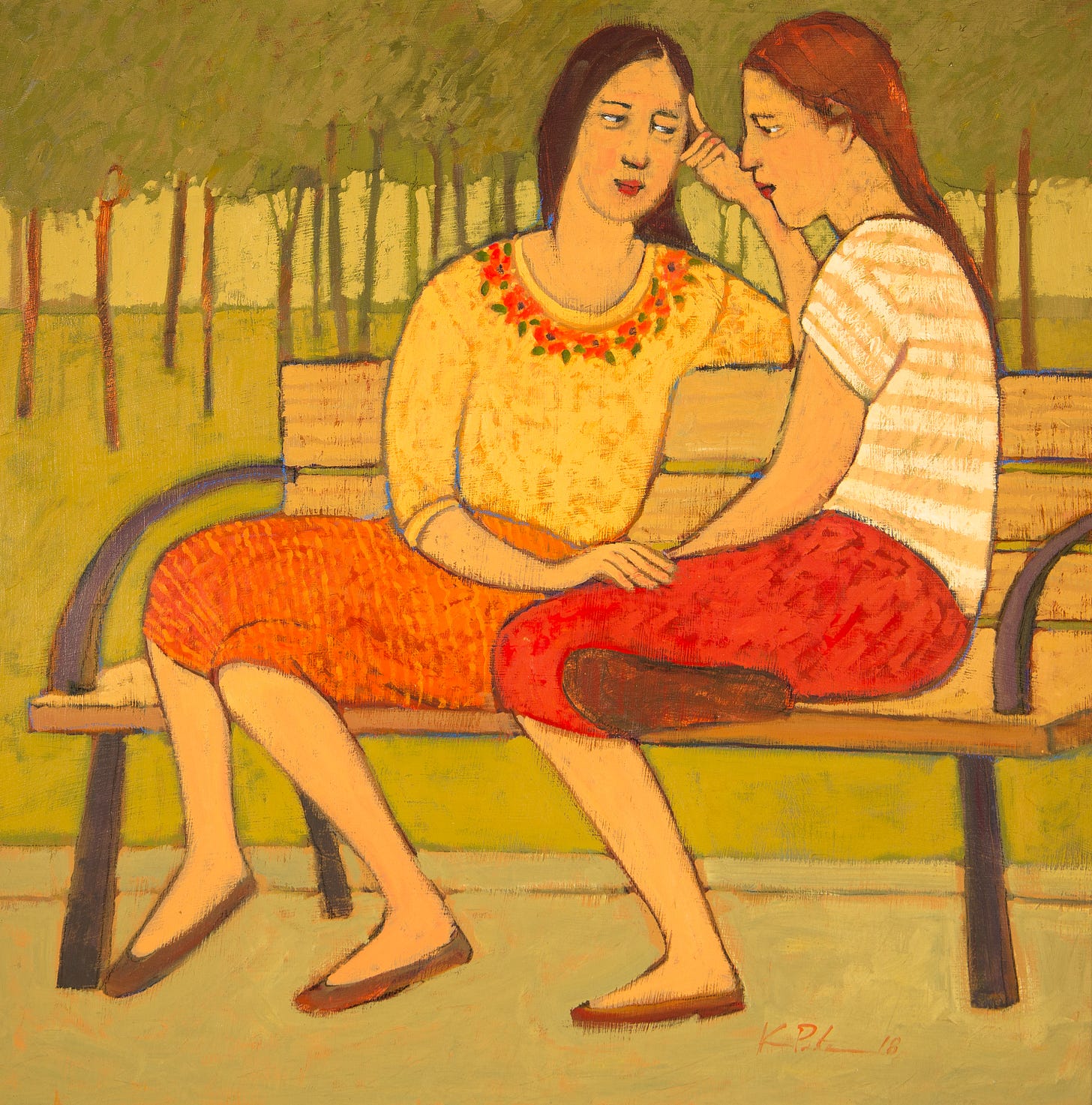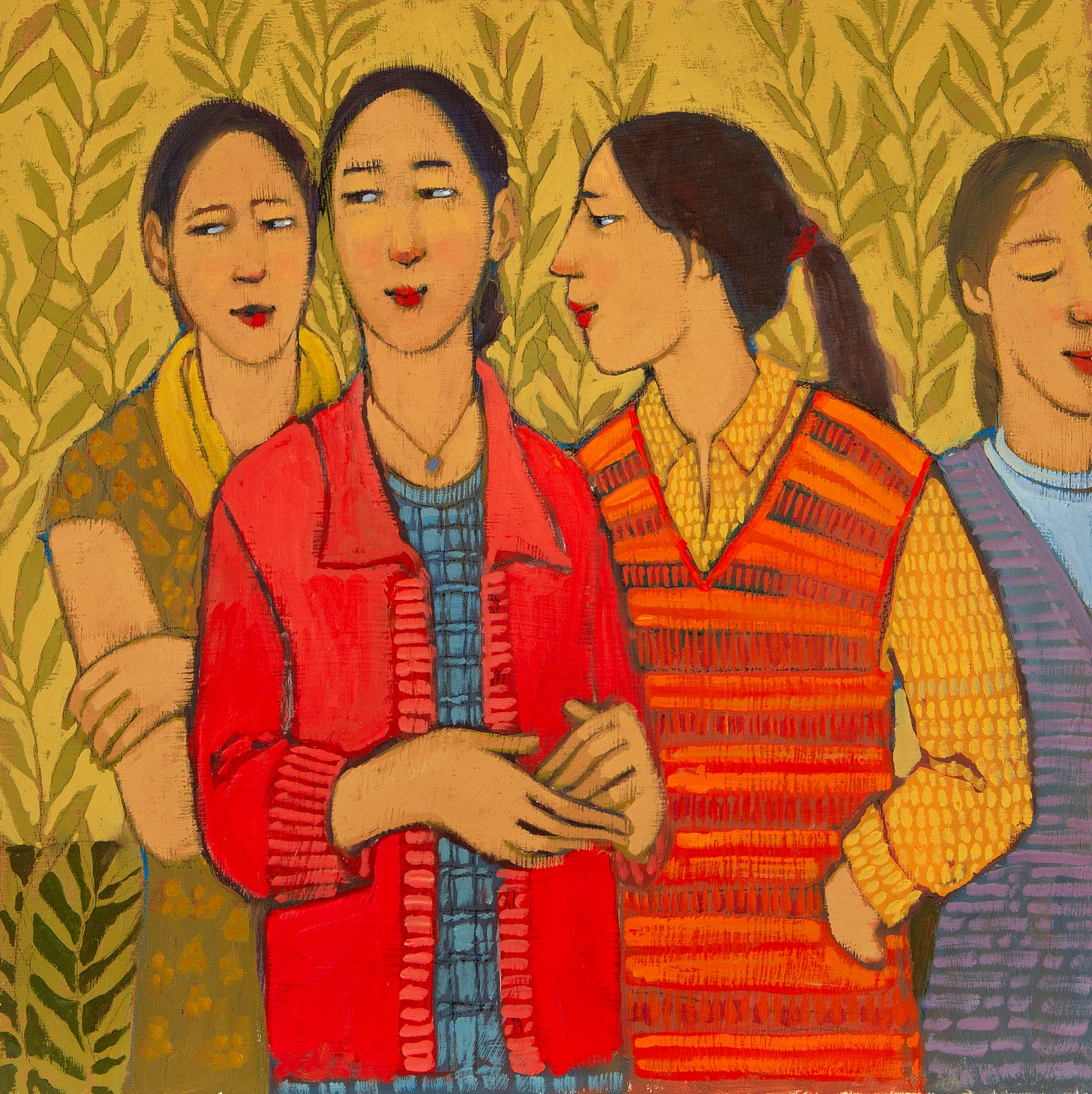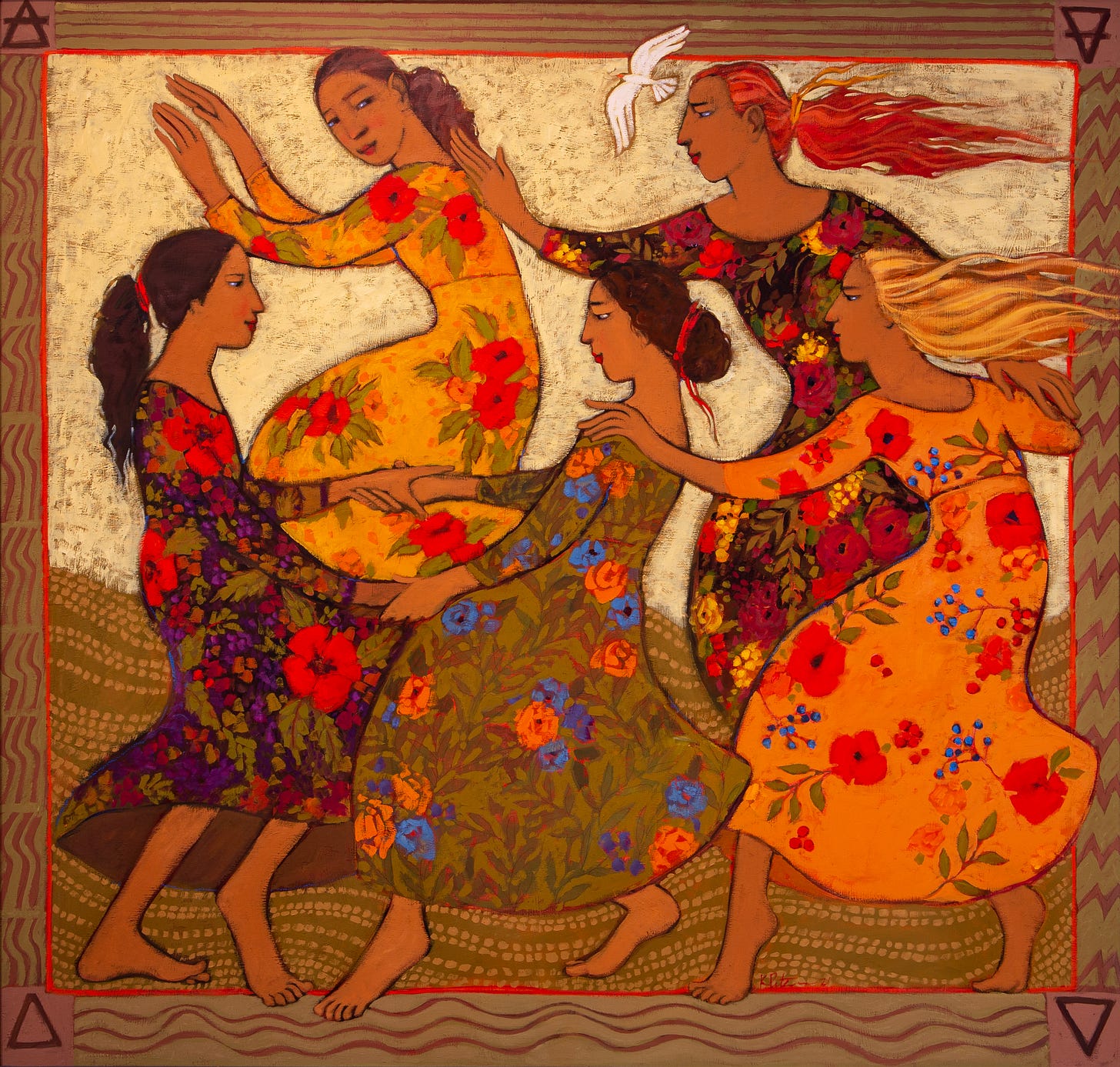Blood and Milk
Truth in the Body
The woman in the hospital bed was young, early twenties, and she held a baby girl. Her face was bare, a little bit swollen, and pale. She had given birth a handful of hours before, and now I, the chaplain, had come to admire the baby in her arms—her lifeless, stillborn child.
“Admire” is a strange verb to use when gazing at a deceased baby, but admire her I did. I bent my knees and leaned in to get closer, asked the mother for permission to touch, and set a finger on the tiny hand in front of me. I knew to admire the baby because I had been here before—not in this exact situation, of course, but in the aftermath of what medical professionals call fetal demise. I had been with mothers who felt relief, and with mothers who felt grief, and horror, and with a woman who planned to give her baby to a cousin for adoption until the baby died before there was a chance.
This particular mother—I’ll call her Sofia—badly wanted this baby, and this baby could have survived, but did not. As I looked at the child, I admired the formation of her fingers and toes and lips, and remembered how, a few years before, while working as a hospital chaplain, a mentor had prepared me. She’d told me to take a moment to admire stillborn babies, because doing so means something to their mothers.
It had been hard sometimes to look at those babies with skin so purplish, so fragile, a little translucent. The scenes were entirely painful for everyone, so painful that some visitors did not want to look at all. Yet the mothers who had wanted the babies could not stop looking. They looked and they looked and they looked.
And when they looked, they saw a being they had loved from the beginning, and they saw dreams they had dreamed for that being and for themselves, so losing that being was not just the death of a baby but also the death of many dreams.
It was a loss so vast that the brain could not stretch itself around the entirety of it, and so mothers gazed upon the bodies that their own bodies had deposited into the world. Mothers sometimes blamed themselves, as if they could have brought the baby to life had they only mustered enough strength, had they only done something differently.
In this case, I, a chaplain on the military base, had been summoned here by the father of the baby who sat bedside in a white shirt and tie, formal for the occasion and the setting of a military hospital, but not out of place in Mormon culture. He had dressed up to give the baby a blessing when she came out of the womb, before her burial.
I had met the couple at church a few months before, and I remembered how the mother’s lean frame, in a floral-patterned dress, had barely showed a bump when she pulled a hand to her belly and told me, “We’re expecting.”
Now, she was lying in a hospital bed, holding her lifeless child.
“Do you have any scriptures for us that can bring comfort?” her husband asked.
I looked at Sofia, who did not at that moment seem interested in scriptures, who had taken her eyes off her child for only a second to greet me, and who tenderly stroked the face of the baby girl. I recited a verse about God binding up the brokenhearted, but the words felt totally inadequate for the raw suffering of this moment, the shock of this loss.
“Thank you,” said the husband. He looked over at Sofia, then down at the baby. “Is the baby bleeding?” he asked.
“Just a little,” she said, dabbing the baby’s cheek with a tissue.
“What do you need right now, Sofia?” I asked. “Do you want visitors in the room? Do you want alone time? Do you want to rest?”
“Rest sounds nice,” she said.
I offered a prayer for the couple and left them with my cell phone number.
Driving home, weaving my way off the military base and onto the highway, I reflected on the work of a chaplain—to hold space for suffering, to witness it, to respond, even when language falls short.
For years, I had pleaded with my church for the chance to do this work. The Church of Jesus Christ of Latter-day Saints had never allowed women to serve as military chaplains, but I believed we were meant for it.
And now, here I was. Eight years after my first request, and a year into my military career, I understood, viscerally, just how right it was to be doing this work. Back then, I hadn’t grasped how physical this calling would be. I hadn’t known how deeply connected I would feel with other women—not just emotionally, but in the ache of my muscles and the bleeding of my body.
The day after I visited Sofia, her husband, and their baby in the hospital, I knew I had unfinished business. I could not stop thinking about the practicalities the couple faced, like feeding themselves, which becomes a strangely oppressive task when you’re grieving.
I’d been on base since 6:30 a.m.—a workout, a full shift, and now, hours later, a stop at the commissary. I called Sofia’s husband.
“What does she need?” I asked.
He listed snacks.
“Anything else?”
“She’s leaking milk,” he said. “Can you get her pads for that?”
I didn’t know the name for those. I told three different people in the commissary that I was looking for pads for leaking breast milk.
A man sent me to a woman who sent me to a place in the store that didn’t have any, and then told me the store next door might have some. So I went and asked a woman behind the customer service desk.
“Someone just had a stillborn,” I said, “and I need to find those breast pad things to help with leaking milk.”
“Oh Lord,” she said, shaking her head. “Oh Lord, that poor girl, losing her baby. Here,”
She told me. “I’ll show you where the nursing pads are.”
Nursing pads. Of course.
I had been on the Air Force base for thirteen hours now and, like Sofia, I too was bleeding. That morning, during a mandatory military workout, I had worn running shorts with built-in underwear. After the workout, I discovered I’d forgotten to bring underwear to wear under my military uniform. I lived too far from base to drive home, so I pulled my thick camouflage pants over my bare skin, feeling exposed and uncomfortable.
Then I started my period.
As the long workday stretched on, I ran out of tampons. I tried a pad, but it slid down the leg of my pants and stuck to my shin above my combat boot. Now, blood trickled down my leg as I made my way through the aisles of the store. Urgency took over—I grabbed a box of tampons from the shelf and hurried to the customer service desk.
"I’ll pay for these, I promise, but I need one now," I said, hardly pausing for a response before rushing into the bathroom.
I did what I could to clean up, thankful that my uniform masked most of the blood. I paid for the supplies, and pushed a full shopping cart out of the store and into the sun. My uniform wet from sweat in Mississippi’s unforgiving humidity, I leaned into the cart, steadying myself, and realized how exhausted I was. My body, salty and bloody, felt burdened with gravity.
I thought about how a bleeding body forces us to slow down. I thought about the toll of nature on women’s bodies. I thought about what Sofia was enduring, and how, in that moment, our bodies were bleeding together, for different reasons. I drove to her apartment and delivered my offerings: food, flowers, a soft blanket. I spoke to the couple quietly, then washed the dishes in their sink and headed home. Night had fallen. I blinked my red eyes hard, willing them to stay open and alert on the highway.
At home, as I pulled off my combat boots; stripped away my sweaty, soiled clothes; scrubbed at the dried blood on my pants, trying to erase stains that would never fully go away; and stepped into the shower, watching blood mix with water around my feet, I thought of some of the women I had met during my time as a chaplain.
A woman who attempted to take her life and survived. A woman raped by a colleague, but too afraid to report it. A woman planning an abortion, terrified of repeating her mother’s neglect. A woman raped over years by her husband, even as she breastfed their daughter. A woman whose body, traumatized from relentless shelling during combat, stopped menstruating altogether. “I grieved that,” she had told me. “I had wanted another baby.”
With these women, I had both wept and borne witness to their weeping. I hadn’t carried all they carried, but like them, my body had bled. Like them, my body had known vulnerability. And like some of them, I had grieved the loss of an unborn child.
Five years earlier, my body had endured a long miscarriage. One day in the bathroom, my hands cradled a chunk of warm, spongy tissue that had fallen from me. I picked it up off the floor with a white napkin. I had been eleven weeks pregnant when an ultrasound revealed the fetus had stopped growing at six.
The OB had assured me that my body would expel it naturally. “You’re probably near the end of it,” she said, but my body bled, and bled, and bled for as many weeks as I had been pregnant. It bled through graduate school final exams and through my graduation one week later. It bled through the unraveling of my marriage in lonesome, heart-wrenching weeks.
At eleven weeks, the bleeding had stopped. I thought it was over. Then, while teaching a yoga class, I felt a sudden gush. Blood seeped through my thin pants onto the cushion beneath me. I fled to the bathroom and stuffed wads of toilet paper in my underwear, then drove home sitting on a Trader Joe’s paper bag.
I had endured so much, spent so many moments on the bathroom floor, staring at blood-soaked tissue, trying to comprehend the life that had been there and then was not: alive for six weeks, dead inside me for five, and then spilling out of my body, coming out of me in pieces.
I now think often about this body, this blood, this mortality, and how they make me who I am.
I think about the men who told me I did not belong in military chaplaincy because of my uterus, because of my blood, my breasts, my gender, my gentleness—who claimed women had no place here. How wrong they were.
Women are chaplains. We bleed with each other, for each other, and for the men in our lives. We birth new human beings. We suffer for and succor one another and our lovers and our children. Our children suckle and grow, knowing the love and power of the mother. And while chaplaincy is not motherhood, to chaplain is, to some degree, to mother. To nourish.
That night in the commissary, my body ached thinking about Sofia, a bereaved mother at home bleeding and leaking milk. She had gone through labor only to lose the child she had bled for, the child her breasts now filled with milk to nourish but would never feed.
In one swift moment, I felt my body united with the bodies of women everywhere because of this one thing: blood. How many times have we found ourselves in the bedroom, the bathroom, the hospital bed, looking at blood, or dreading to look, or wiping it from our bodies, or picking it up?
It was in the middle of a military commissary, in a weary, bloodstained state, looking for pads for another woman to leak milk on, that I felt the presence of a divine mother holding us, witnessing our blood and our milk. She was the hum of the universe, a perfect sound, the earth, its fruit, the blood, the milk, the love that binds us together—a great mother god giving herself to us again and again and again.
I felt her alive within me.
Jenna Carson is a chaplain in the United States Air Force. She co-hosts Guiding Light Podcast and is working on a memoir about her experiences as a prison chaplain. She wrote "Blood and Milk" at the inaugural Artists Residency at the Center.
Kathleen Peterson is a Utah-based artist working in oils, watercolors, batik, and more. @kathleenpetersonart.








Thank you. I have thought a lot about how menstruation, childbirth, and even menopause can communicate powerful spiritual lessons if we look for them. I appreciate this new perspective and that you added lactation to the list. I am going to be thinking about this essay for a long time. It is a treasure!
Women are chaplains! Jenna, thank you for sharing your experience. It's beautifully told and feels so resonant. I'm glad that you persevered in your sense of personal mission.